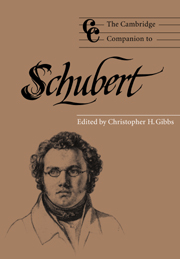Introduction: the elusive schubert
Published online by Cambridge University Press: 28 September 2011
Summary
wanderer! hast thou heard schubert's songs?
here lies he who sang them.
he was placed near the best ones when he died, and yet
he was still scarcely half-way in his career.
Franz Grillparzer, Vienna's preeminent poet, sketched five epitaphs for Schubert's grave (SDB 899). The controversial one ultimately adopted – the art of music here entombed a rich possession, but even far fairer hopes – has been interpreted in various ways. Robert Schumann, Schubert's most astute early critic, lost patience with Grillparzer: “It is pointless to guess at what more [Schubert] might have achieved. He did enough; and let them be honored who have striven and accomplished as he did.”
Perhaps Grillparzer's words are better viewed not as a lament over the loss of what more Schubert might have achieved had he lived longer, but rather as evidence of how the composer's genuine artistic achievement was not fully appreciated during his own time, how the true scope of his accomplishment eluded even some of his most sympathetic friends and admirers. During Schubert's lifetime, Grillparzer and the majority of his contemporaries never heard Schubert's late piano sonatas, the C Major String Quintet, the mature symphonies and operas. Many of his supreme compositions remained unknown to a Biedermeier Vienna that revered Beethoven, adored Rossini, and thrilled to Paganini.
Schubert's position, literally as well as symbolically, has changed dramatically since his death in 1828 at the age of thirty-one. Over the course of the nineteenth century, he gradually joined the elect, becoming an immortal composer: the peer of Beethoven, and superior to Rossini and Paganini.
- Type
- Chapter
- Information
- The Cambridge Companion to Schubert , pp. 1 - 12Publisher: Cambridge University PressPrint publication year: 1997

